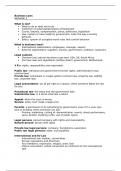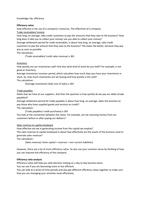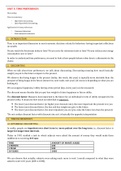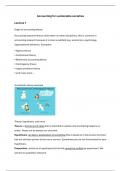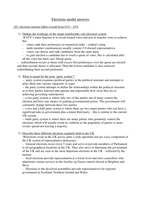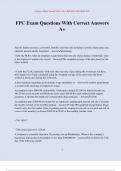Applied Cognitive Psychology – Lecture 1 (Introduction)
Outcome = Cognition x Environment
the degree to which goals are attained are a result of interplay between the users
(cognition) and the environment
indicators to evaluate goal
improving the system using factors: improve the interaction between the user and the
environment to better meet the intended goals
change the cognitive functioning of the users or change the properties of the
environment
testing the causal influence of certain factors on particular dependent variables (the
indicators)
,Lecture 2 – Fundamentals
Intro: Morgan Freeman movie; Statement that we only use 10% of brain at a time
WRONG (100% brain activity would be seizure)
Human Information Processing (perceptual encoding, central processing, responding)
Automatization of Info Processing evolution to respond quickly (to threat)
Prevention of automatization e.g. in flight safety
Automatized vs. controlled processing (slow vs fast)
PERCEPTUAL ENCODING
o Perception, sensory input
o low level phenomena (adaptation to motion, colours, lateral inhibition)
o Bottom-up (saliency) vs. Top-down (predictions, expectations about
environment)
o As quality of bottom-up info goes down, top-down influence increases!
ATTENTION
o Broadbent’s Attentional Filter: early selection on attended channel
o But even if we don’t attend to sth, it is still processed cocktail party effect,
dichotic listening task (no conscious access to unheard stimulus, but
unattended perceptual input is still processed)
o William James = “if we attend to sth, we are conscious of it”
o Overt (physical change in body) vs. covert attention (no bodily movements,
we can redirect attention without moving; Posner experiment)
o Endogenous (from inside, controlled, targeted, top-down; colour-changing
cardtrick, gorillaattentional blindness) vs. Exogenous attention (from
outside, not intentional, external stimuli, automatic, bottom-up/stimulus-
driven)
o We can use exogeneous attention in clever wayscolours, text, follow gaze of
people, e.g. in sales gaze of model to actual product
o Visual search pop-out effect, conjunction (distracting information)
o Attentional Control (controlled vs. automatic)
o Disadvantage of automatic task: automatization makes you less flexible to
engange in environment that is different than what you’re used to; multi-
tasking can be dangerous (driving)
WORKING MEMORY
o Short-term memorysmall capacity (Miller’s law 7+/-2 items); short duration
(max 20 sec without rehearsal)
o Primacy and Recency effect, recall easiest for first/last items
o Facilitate memory through: Chunking, Interference (Stroop effect)
o Baddeley and Hitch Model of Working memory
, Visuospatial Sketchpad (ability to maintain visual information,
mental rotation)
Phonological loop (auditory counterpart, capacity = 2.5 seconds)
different storage spaces, can be used simultaneously
Central Executive (homunculus? Control)
INHIBITION (e.g. simon effect, stoop effect, stop signal)
SHIFTING (switching cost, Wisconsin card sorting task, multi-task)
UPDATING (face recognition)
rely on healthy dopamine functioning
LONG-TERM MEMORY
o Semantic (factual) vs. Episodic (experiences)
o Explicit vs. Implicit (procedural)
o Patient HM no longer new explicit memories, only implicit memories
o Three stages: Encoding, Storage, Retrieval
o Encoding influenced by
existing schemas pre-existing knowledge and expectations
Elaboration and Specificity
Level of arousal (Yerkes Dodson law) best performance in medium
arousal
o Storage: Decay process (memory gets lost with time), Interference (becomes harder
to distinguish bw memories when they interfere)
o Retrieval: Spontaneous recall, cued recall, recognition (easiest way of memory
retrieval)
o Forgetting insufficient encoding, decay, interference, insufficient retrieval cues,
induced forgetting, reconsolidation
o The Google effect: figure out any answer by googling it
o Transactive memory: remembering where but not what
DECISION-MAKING
o Frontal lobe, involves working memory
o Strategies: Heuristics (low effort, bias) vs. Normative …
o Situational Awareness
o Unconscious influence (e.g. right objects preferred; emotions)
o Morality (moral comparisons)
Outcome = Cognition x Environment
the degree to which goals are attained are a result of interplay between the users
(cognition) and the environment
indicators to evaluate goal
improving the system using factors: improve the interaction between the user and the
environment to better meet the intended goals
change the cognitive functioning of the users or change the properties of the
environment
testing the causal influence of certain factors on particular dependent variables (the
indicators)
,Lecture 2 – Fundamentals
Intro: Morgan Freeman movie; Statement that we only use 10% of brain at a time
WRONG (100% brain activity would be seizure)
Human Information Processing (perceptual encoding, central processing, responding)
Automatization of Info Processing evolution to respond quickly (to threat)
Prevention of automatization e.g. in flight safety
Automatized vs. controlled processing (slow vs fast)
PERCEPTUAL ENCODING
o Perception, sensory input
o low level phenomena (adaptation to motion, colours, lateral inhibition)
o Bottom-up (saliency) vs. Top-down (predictions, expectations about
environment)
o As quality of bottom-up info goes down, top-down influence increases!
ATTENTION
o Broadbent’s Attentional Filter: early selection on attended channel
o But even if we don’t attend to sth, it is still processed cocktail party effect,
dichotic listening task (no conscious access to unheard stimulus, but
unattended perceptual input is still processed)
o William James = “if we attend to sth, we are conscious of it”
o Overt (physical change in body) vs. covert attention (no bodily movements,
we can redirect attention without moving; Posner experiment)
o Endogenous (from inside, controlled, targeted, top-down; colour-changing
cardtrick, gorillaattentional blindness) vs. Exogenous attention (from
outside, not intentional, external stimuli, automatic, bottom-up/stimulus-
driven)
o We can use exogeneous attention in clever wayscolours, text, follow gaze of
people, e.g. in sales gaze of model to actual product
o Visual search pop-out effect, conjunction (distracting information)
o Attentional Control (controlled vs. automatic)
o Disadvantage of automatic task: automatization makes you less flexible to
engange in environment that is different than what you’re used to; multi-
tasking can be dangerous (driving)
WORKING MEMORY
o Short-term memorysmall capacity (Miller’s law 7+/-2 items); short duration
(max 20 sec without rehearsal)
o Primacy and Recency effect, recall easiest for first/last items
o Facilitate memory through: Chunking, Interference (Stroop effect)
o Baddeley and Hitch Model of Working memory
, Visuospatial Sketchpad (ability to maintain visual information,
mental rotation)
Phonological loop (auditory counterpart, capacity = 2.5 seconds)
different storage spaces, can be used simultaneously
Central Executive (homunculus? Control)
INHIBITION (e.g. simon effect, stoop effect, stop signal)
SHIFTING (switching cost, Wisconsin card sorting task, multi-task)
UPDATING (face recognition)
rely on healthy dopamine functioning
LONG-TERM MEMORY
o Semantic (factual) vs. Episodic (experiences)
o Explicit vs. Implicit (procedural)
o Patient HM no longer new explicit memories, only implicit memories
o Three stages: Encoding, Storage, Retrieval
o Encoding influenced by
existing schemas pre-existing knowledge and expectations
Elaboration and Specificity
Level of arousal (Yerkes Dodson law) best performance in medium
arousal
o Storage: Decay process (memory gets lost with time), Interference (becomes harder
to distinguish bw memories when they interfere)
o Retrieval: Spontaneous recall, cued recall, recognition (easiest way of memory
retrieval)
o Forgetting insufficient encoding, decay, interference, insufficient retrieval cues,
induced forgetting, reconsolidation
o The Google effect: figure out any answer by googling it
o Transactive memory: remembering where but not what
DECISION-MAKING
o Frontal lobe, involves working memory
o Strategies: Heuristics (low effort, bias) vs. Normative …
o Situational Awareness
o Unconscious influence (e.g. right objects preferred; emotions)
o Morality (moral comparisons)


